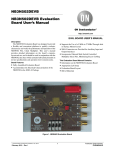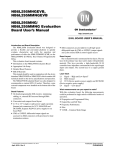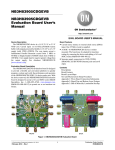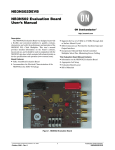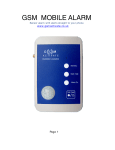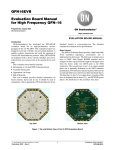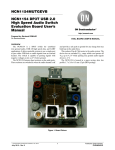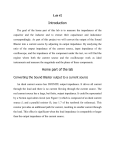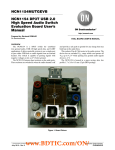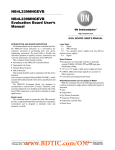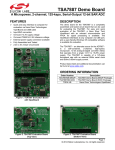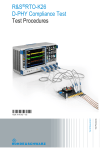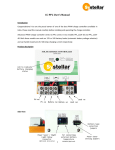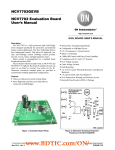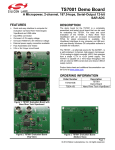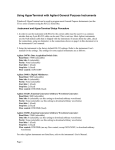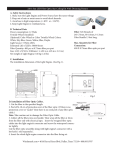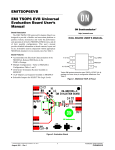Download EVBUM2074 - NB4N507ADEVB Evaluation Board User`s Manual
Transcript
NB4N507ADEVB NB4N507ADEVB Evaluation Board User's Manual http://onsemi.com Description EVAL BOARD USER’S MANUAL The NB4N507ADEVB Evaluation Board provides a flexible and convenient platform to quickly evaluate, characterize and verify the performance and operation of the NB4N507A PECL Clock Synthesizer. This user’s manual provides detailed information on board contents, layout and its use. It should be used in conjunction with a device datasheet: NB4N507A. (www.onsemi.com) Board Layout The evaluation board is constructed with Getek material with 50 W trace impedances and is designed to minimize noise, achieve high bandwidth and minimize crosstalk. The NB4N507A evaluation board is equipped with 3−position slide switches. These switches are used to manipulate the static input logic levels of the Multiplier Select pins, S0 and S1, and Output Enable pin, OE. The H position of the slide switch asserts a logic HIGH on the assigned pin, the L asserts a logic LOW and the M is an open where the pin “floats” to a mid−logic level by way of the device’s internal pull−up and pulldown resistors. Multiplier Select pins, S0 and S1, and Output Enable pin, OE, also have SMA connector provisions, if the application requires them. Board Features • Accommodates the Electrical Characterization of the NB4N507A in 16−pin 150 mil SOIC Package • Supports use of a 10 MHz to 27 MHz Through−hole or • • • • • Surface Mount Crystal Incorporates on Board Slide Switch Controlled Multiplier Select and OE Logic Pins, Minimizing Excess Cabling SMA Connectors are Provided for Auxiliary Input and Output Interfaces Differential PECL Outputs Loaded/Terminated On−board; Output Signals are Monitored via SMA Connectors Convenient and Compact Board Layout 3.3 V or 5.0 V Single or Split−Power Supply Operation Layer Stack L1 Signal L2 SMA Ground L3 VCC (Positive Power Supply) and DUTGND (Device Ground, Negative Power Supply) L4 Signal Figure 1. Evaluation Board www.BDTIC.com/ON/ © Semiconductor Components Industries, LLC, 2012 April, 2012 − Rev. 2 1 Publication Order Number: EVBUM2074/D NB4N507ADEVB LAB SETUP PROCEDURE Power Supply Connections and Output Termination Use high−impedance probes of the oscilloscope or frequency counter to monitor the (LV)PECL CLKOUT outputs. The NB4N507A has a positive supply pin, VDD, and a negative supply pin, DUTGND. SMAGND is the ground plane for the SMA connectors. Power supply banana plug connectors for VDD, DUTGND and SMAGND are provided in the corners of the board. The (LV)PECL CLKOUT outputs have non−standard, open collector outputs and must be externally DC loaded and terminated. Thevenin equivalent load and termination resistors are provided on−board at the output’s SMA connector. “Spilt” Power Supply (Optional) For some tests, an optional “split” or dual power supply technique can be used, however, doing so will double terminate the (LV)PECL outputs into 50 Ws of an oscilloscope or a frequency counter, and will therefore, appear to halve the output amplitude. Since VTT = VDD – 2.0 V, off setting VDD by +2.0 V yields VTT = 0 V or Ground. The VTT terminal connects to the isolated SMAGND connector ground plane, and is not to be confused with the device ground pin or DUTGND. Single Supply (Recommended) Connect a single power supply to the evaluation board. (see Figure 2); Connect VDD to +3.3 V, Connect GND to 0 V. Table 1. POWER SUPPLY CONFIGURATIONS Device Pin Power Supply Single Supply “Spilt” Power Supply (Optional) VDD RED +3.3 V or +5.0 V VDD = +2.0 V SMAGND BLACK 0V VTT = VDD – 2.0 V = 0 V DUTGND BLACK 0V DUTGND = −1.3 V (or –3.0 V) Dual Power Supplies Power Supplies +3.3 V + +2.0 V − + VCC GND VDD +1.3 V − + − VTT GND +3.3 V +3.3 V Figure 3. “Split” Power Supply Connections Figure 2. Single Power Supply Configuration www.BDTIC.com/ON/ http://onsemi.com 2 NB4N507ADEVB Open Traces (Intentional) For Crystal Use SMAGND VDD Signal Generator OUT 10 MHz to 133 MHz 50 W (Optional) DUTGND Real Time, Digital Oscilloscope, or Frequency Counter PECL Output Load/Termination Resistors CLKOUT CLKOUT Hi−Z or 50 W Trigger Hi−Z or 50 W Figure 4. NB4N507A Evaluation Board LAB SETUP AND MEASUREMENT PROCEDURE Equipment Used a.. Connect a single power supply to the evaluation board. (see Figure 2) Connect VDD to +3.3 V Connect GND to 0 V b.. or; Connect a “split” power supply to the evaluation board. (see Figure 3) Connect VCC banana jack to +2.0 V Connect VTT banana jack to SMA_GND= 0 V Connect GND banana jack to −1.3 V for 3.3 V operation, or −3.0 V for 5.0 V operation 2. Determine if a crystal or an external clock reference will be used. a.. For crystal use, install a crystal • Agilent Signal Generator #33250A for CLK, External Clock Source • Tektronix or LeCroy with High Impedance Probes or TDS8000 Oscilloscope or Frequency Counter • Agilent #6624A DC Power Supply • Digital Voltmeter • Matched High−speed Cables with SMA Connectors for the PECL CLKOUT Pins In order to get started and demonstrate the NB4N507A, perform the following test setup sequence: 1. To monitor the CLKOUT outputs on an oscilloscope or frequency counter; www.BDTIC.com/ON/ http://onsemi.com 3 NB4N507ADEVB 5. b.. For external clock reference use, short the open trace at Pin 1 and provide an external clock reference from a signal generator (10 − 27 MHz) into the X1/CLK pin. Terminate the signal generator with 50 W to SMA ground. 3. Set the programmable S0 and S1 pin switches accordingly to achieve the desired function table logic input levels. 4. Set the OE pin to a logic HIGH a.. If a single power supply is used, connect the CLKOUT outputs to the oscilloscope with matched high−impedance probe cables. b.. If a split power supply is used, connect the CLKOUT outputs to the oscilloscope with matched cables. 6. Ensure the oscilloscope is triggered properly. Trigger the oscilloscope from the CLKOUT output. NB4N507A EVALUATION BOARD PIN DESCRIPTIONS AND FEATURES BY PIN The H position of the DIP switch asserts a logic HIGH (VCC) on the assigned pin and the L asserts a logic LOW (DUTGND). The S0 and S1 device pins have internal pull−up and pulldown resistors. When left open, the S0 or S1 switch “floats” to mid−logic level. In the M position, the slide switch is an open and the pin “floats” to the mid−logic level. The NB4N507A Evaluation Board was designed to accommodate the test and evaluation of the NB4N507A PECL Clock Synthesizer. Detailed board features by device pin are described below: Crystal (X1/CLK and X2) A through−hole or surface mount crystal can be used. The metal traces at the crystal pins are intentionally open for crystal use and will have no impedance affect on the crystal pins. CLKOUT and CLKOUT The CLKOUT and CLKOUT PECL outputs have equal length, 50 W board traces with SMA connectors. Matched cables can connect to an oscilloscope or frequency counter. The (LV)PECL CLKOUT outputs have nonstandard, open collector outputs and must be externally DC loaded and terminated. Thevenin equivalent load and termination resistors are provided on board at the output’s SMA connector. X1/CLK − External Clock An SMA connector is provided for X1/CLK if an external clock source is used on Pin 1. The metal trace at the package pin is intentionally open for crystal use, but, must be shorted for a connection to Pin 1 for external clock use. The unused component pad labeled C2 (used for the crystal load capacitor) may be used for a 50 W resistor to ground to terminate an external signal generator. OE The Output Enable function can be exercised manually with the OE switch when the JMP4 jumper is used, or they can be controlled externally via the SMA connector and the jumper open. S0 and S1 The S0 and S1 multiplier select pins can be exercised manually with the S0 and S1 slide switches when the jumpers are used across JMP2 and JMP5, or they can be controlled externally via the SMA connectors with the jumpers open. www.BDTIC.com/ON/ http://onsemi.com 4 NB4N507ADEVB Figure 5. Evaluation Board Schematic www.BDTIC.com/ON/ http://onsemi.com 5 NB4N507ADEVB Table 2. NB4N507A DEMO / EVALUATION BOARD BILL OF MATERIALS Value Qty BANANA1 Reference Designators Connector, Banana Jack, Deltron, Mouser #164−6219 Description RED 1 BANANA2, BANANA3 Connector, Banana Jack, Deltron, Mouser #164−6218 BLACK 2 C3, C7, C10, C12 Cap, Chip, 0.010 mF, 0805, 50 V, 10% 0.01 mF 4 C4, C6, C8, C11 Cap, Chip, 0.1 mF, 0805, 50 V, 10% 0.1 mF 4 C5, C9 Cap, Chip, 22 mF, Tant ”C”, 16 V, 10% 22 mF 2 C13 Cap, Chip, 22 mF, 1210, 10 V, Y5V 22 mF 1 J1, J2, J3, J4, J5, J6, J7 Connector, SMA, Edge Mount, Johnson #142−0711−821 JMP2, JMP4, JMP5 Header, Male, Square, Single Row, 40 Pin 2 Pins 3 R1, R4 Resistor, Chip, 62 W, 0603, 1/10 W, 1% 62 W 2 R2, R3 Resistor, Chip, 270 W, 0603, 1/16 W 1% 270 W 2 R5, R8, R9 Not applicable − − R7 Resistor, Chip, 0 W, 0805, 1/8 W, 5% 0W 1 SW1, SW2, SW3 Switch, C&K, 3 Position, Miniature, #OS103011MS8QP1 Y1 Crystal, ABRACON #ABL−25.000MHZ−B2F (Through−Hole) CTS FREQ . #ATS 250 BSM−1E (Surface Mount) CTS FREQ. #ATS 250 B−3 (Through−Hole) Y1 (for Through−hole Xtal) Pin Receptacle, Ampere, .140 lg, Maximum Pin 0.021 Tin, Gold 7 3 25 MHz 1 2 ON Semiconductor and are registered trademarks of Semiconductor Components Industries, LLC (SCILLC). SCILLC reserves the right to make changes without further notice to any products herein. SCILLC makes no warranty, representation or guarantee regarding the suitability of its products for any particular purpose, nor does SCILLC assume any liability arising out of the application or use of any product or circuit, and specifically disclaims any and all liability, including without limitation special, consequential or incidental damages. “Typical” parameters which may be provided in SCILLC data sheets and/or specifications can and do vary in different applications and actual performance may vary over time. All operating parameters, including “Typicals” must be validated for each customer application by customer’s technical experts. SCILLC does not convey any license under its patent rights nor the rights of others. SCILLC products are not designed, intended, or authorized for use as components in systems intended for surgical implant into the body, or other applications intended to support or sustain life, or for any other application in which the failure of the SCILLC product could create a situation where personal injury or death may occur. Should Buyer purchase or use SCILLC products for any such unintended or unauthorized application, Buyer shall indemnify and hold SCILLC and its officers, employees, subsidiaries, affiliates, and distributors harmless against all claims, costs, damages, and expenses, and reasonable attorney fees arising out of, directly or indirectly, any claim of personal injury or death associated with such unintended or unauthorized use, even if such claim alleges that SCILLC was negligent regarding the design or manufacture of the part. SCILLC is an Equal Opportunity/Affirmative Action Employer. This literature is subject to all applicable copyright laws and is not for resale in any manner. PUBLICATION ORDERING INFORMATION LITERATURE FULFILLMENT: Literature Distribution Center for ON Semiconductor P.O. Box 5163, Denver, Colorado 80217 USA Phone: 303−675−2175 or 800−344−3860 Toll Free USA/Canada Fax: 303−675−2176 or 800−344−3867 Toll Free USA/Canada Email: [email protected] N. American Technical Support: 800−282−9855 Toll Free USA/Canada Europe, Middle East and Africa Technical Support: Phone: 421 33 790 2910 Japan Customer Focus Center Phone: 81−3−5817−1050 ON Semiconductor Website: www.onsemi.com Order Literature: http://www.onsemi.com/orderlit For additional information, please contact your local Sales Representative www.BDTIC.com/ON/ http://onsemi.com 6 EVBUM2074/D







